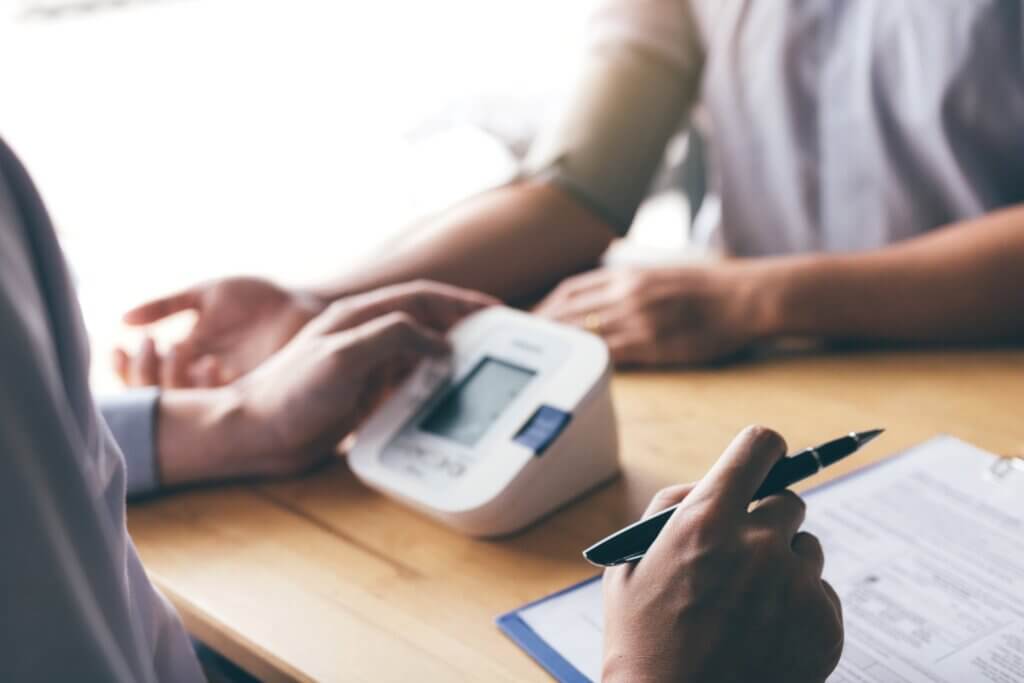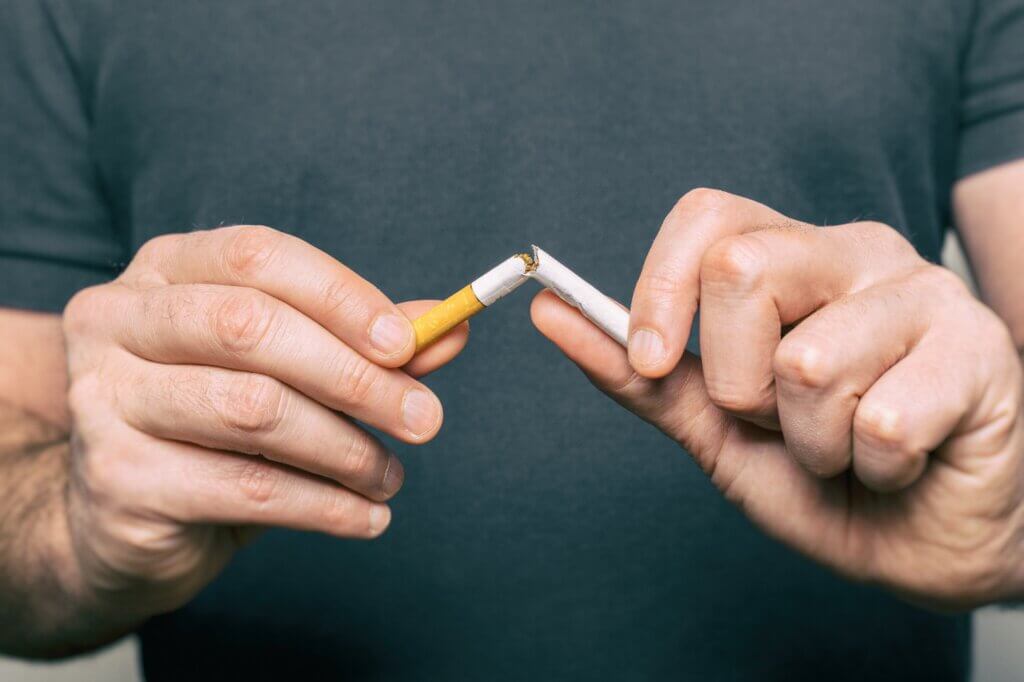What's the Link Between Hypertension and the Kidneys?

According to the World Health Organization (WHO), 1.28 billion adults between the ages of 30 and 79 worldwide have hypertension. It’s one of the most common medical conditions worldwide, one that’s also associated with other complications. Today we review the relationship between hypertension and the kidneys.
Only 42% of hypertensives have been diagnosed and treated. 58% of people with hypertension worldwide either don’t know they have it or don’t receive treatment. As we’ll see shortly, in the absence of treatment, high blood pressure can affect the kidneys. Let’s see how according to scientists.
Hypertension and the kidneys
As the experts point out, hypertension contributes to the progression of kidney diseases, as well as to the appearance of cardiovascular events such as myocardial infarction, heart failure, and strokes.
Blood pressure is nothing more than the force of the blood pushing against the walls of the blood vessels when the heart pumps blood. At the moment in which this pressure exceeds a certain threshold, it’s said that the person suffers from hypertension or has high blood pressure.
According to the American Heart Association, normal blood pressure is around 120/80 mmHg. Values that exceed this range, whether temporary or permanent, are classed as hypertension. For their part, the kidneys are two organs that are responsible for filtering waste and excess water, producing urine.
Urine flows through each kidney to the bladder through a pair of tubes called the ureters. The bladder stores urine, which is then expelled during urination.
What happens to the kidneys in hypertensive people?

Over time, and especially in uncontrolled patients, high blood pressure can cause the arteries around the kidneys to narrow, weaken, or harden. As a consequence, the following happens:
- The nephrons do not receive the essential oxygen and nutrients to regulate their function. They are structural units responsible for purifying the blood.
- The kidneys cannot remove all the waste and excess fluid from the blood.
- Excess fluid present in the blood vessels can increase blood pressure. This, in turn, worsens the damage to the blood vessels that supply the kidney.
- As more of the arteries to the kidney become blocked, these organs eventually fail.
Generally speaking, damaged arteries cannot deliver enough blood to kidney tissue. As the researchers point out, the main consequence of untreated hypertension is chronic kidney disease (CKD).
In fact, high blood pressure is the leading cause of CKD worldwide. In general, this is the mechanism by which hypertension affects the kidneys.
Risk factors for hypertensive kidney disease
We have already had a general look at the link between hypertension and the kidneys. As expected, this consequence is more likely in some cases than in others. Here’s a summary of the main risk factors for renal disease due to hypertension:
- Aging: Specialists report that the relationship between hypertension and kidney problems or disease increases over time. Blood pressure tends to rise or get out of control as you age, and blood vessels naturally harden and deteriorate over the years.
- Uncontrolled patients: Treatment for hypertension allows blood pressure levels to be reduced to a healthy range. In the absence of therapy, the damage is further accelerated. This isn’t to mention that episodes of hypertensive crisis are more frequent.
- Unhealthy habits: A sedentary lifestyle, high sodium intake, smoking, and drinking alcohol (among other things) can worsen hypertension. Those who fit all these categories are more likely to have the condition affect the kidneys.
- Underlying diseases: This includes diabetes. The relationship between hypertension, diabetes, and chronic kidney disease (CKD) is well-studied. High blood sugar levels and high blood pressure together can damage blood vessels throughout the body, but those in the kidneys are the most affected.
A family history of kidney disease and hypertension, being male, Hispanic, or African-American are also considered risk factors for kidney damage from hypertension.
Can kidney damage from hypertension be prevented?

Before answering this, you should know that hypertension can be both a cause and a consequence of kidney disease.
Therefore, you must include habits that allow you to reduce the chances of developing both conditions; or in any case, to control them. There are many things you can do about this, but the main ones are the following:
- Limit alcohol consumption.
- Avoid tobacco intake.
- Exercise regularly.
- Implement a balanced diet (low in fat, sodium and sugar).
- Avoid self-medicating.
- Keep underlying diseases under control.
- Control emotional episodes.
- Take the medicines prescribed by the specialist.
- Keep a healthy weight.
- Reduce stress levels.
- Get enough rest at night.
- Drink plenty of water.
In general, following a healthy lifestyle is the best option when it comes to preventing hypertension and kidney disease. If you have already been diagnosed with hypertension, be sure to visit the specialist regularly, follow their instructions and take the prescribed medications.
If you have relatives with kidney disease or hypertension, we invite you to be aware of the symptoms and see a specialist annually after the age of 50 (or earlier in the case of men). If you have developed kidney disease due to hypertension, consult with your doctor the available options.
According to the World Health Organization (WHO), 1.28 billion adults between the ages of 30 and 79 worldwide have hypertension. It’s one of the most common medical conditions worldwide, one that’s also associated with other complications. Today we review the relationship between hypertension and the kidneys.
Only 42% of hypertensives have been diagnosed and treated. 58% of people with hypertension worldwide either don’t know they have it or don’t receive treatment. As we’ll see shortly, in the absence of treatment, high blood pressure can affect the kidneys. Let’s see how according to scientists.
Hypertension and the kidneys
As the experts point out, hypertension contributes to the progression of kidney diseases, as well as to the appearance of cardiovascular events such as myocardial infarction, heart failure, and strokes.
Blood pressure is nothing more than the force of the blood pushing against the walls of the blood vessels when the heart pumps blood. At the moment in which this pressure exceeds a certain threshold, it’s said that the person suffers from hypertension or has high blood pressure.
According to the American Heart Association, normal blood pressure is around 120/80 mmHg. Values that exceed this range, whether temporary or permanent, are classed as hypertension. For their part, the kidneys are two organs that are responsible for filtering waste and excess water, producing urine.
Urine flows through each kidney to the bladder through a pair of tubes called the ureters. The bladder stores urine, which is then expelled during urination.
What happens to the kidneys in hypertensive people?

Over time, and especially in uncontrolled patients, high blood pressure can cause the arteries around the kidneys to narrow, weaken, or harden. As a consequence, the following happens:
- The nephrons do not receive the essential oxygen and nutrients to regulate their function. They are structural units responsible for purifying the blood.
- The kidneys cannot remove all the waste and excess fluid from the blood.
- Excess fluid present in the blood vessels can increase blood pressure. This, in turn, worsens the damage to the blood vessels that supply the kidney.
- As more of the arteries to the kidney become blocked, these organs eventually fail.
Generally speaking, damaged arteries cannot deliver enough blood to kidney tissue. As the researchers point out, the main consequence of untreated hypertension is chronic kidney disease (CKD).
In fact, high blood pressure is the leading cause of CKD worldwide. In general, this is the mechanism by which hypertension affects the kidneys.
Risk factors for hypertensive kidney disease
We have already had a general look at the link between hypertension and the kidneys. As expected, this consequence is more likely in some cases than in others. Here’s a summary of the main risk factors for renal disease due to hypertension:
- Aging: Specialists report that the relationship between hypertension and kidney problems or disease increases over time. Blood pressure tends to rise or get out of control as you age, and blood vessels naturally harden and deteriorate over the years.
- Uncontrolled patients: Treatment for hypertension allows blood pressure levels to be reduced to a healthy range. In the absence of therapy, the damage is further accelerated. This isn’t to mention that episodes of hypertensive crisis are more frequent.
- Unhealthy habits: A sedentary lifestyle, high sodium intake, smoking, and drinking alcohol (among other things) can worsen hypertension. Those who fit all these categories are more likely to have the condition affect the kidneys.
- Underlying diseases: This includes diabetes. The relationship between hypertension, diabetes, and chronic kidney disease (CKD) is well-studied. High blood sugar levels and high blood pressure together can damage blood vessels throughout the body, but those in the kidneys are the most affected.
A family history of kidney disease and hypertension, being male, Hispanic, or African-American are also considered risk factors for kidney damage from hypertension.
Can kidney damage from hypertension be prevented?

Before answering this, you should know that hypertension can be both a cause and a consequence of kidney disease.
Therefore, you must include habits that allow you to reduce the chances of developing both conditions; or in any case, to control them. There are many things you can do about this, but the main ones are the following:
- Limit alcohol consumption.
- Avoid tobacco intake.
- Exercise regularly.
- Implement a balanced diet (low in fat, sodium and sugar).
- Avoid self-medicating.
- Keep underlying diseases under control.
- Control emotional episodes.
- Take the medicines prescribed by the specialist.
- Keep a healthy weight.
- Reduce stress levels.
- Get enough rest at night.
- Drink plenty of water.
In general, following a healthy lifestyle is the best option when it comes to preventing hypertension and kidney disease. If you have already been diagnosed with hypertension, be sure to visit the specialist regularly, follow their instructions and take the prescribed medications.
If you have relatives with kidney disease or hypertension, we invite you to be aware of the symptoms and see a specialist annually after the age of 50 (or earlier in the case of men). If you have developed kidney disease due to hypertension, consult with your doctor the available options.
- Erfanpoor S, Etemad K, Kazempour S, et al. Diabetes, Hypertension, and Incidence of Chronic Kidney Disease: Is There any Multiplicative or Additive Interaction?. Int J Endocrinol Metab. 2020;19(1):e101061. Published 2020 Nov 2.
- Hanratty R, Chonchol M, Havranek EP, et al. Relationship between blood pressure and incident chronic kidney disease in hypertensive patients. Clin J Am Soc Nephrol. 2011;6(11):2605-2611.
- Phan O, Burnier M, Wuerzner G. Hypertension in Chronic Kidney Disease – Role of Arterial Calcification and Impact on Treatment. Eur Cardiol. 2014;9(2):115-119.
- Zhang YP, Zuo XC, Huang ZJ, et al. The impact of blood pressure on kidney function in the elderly: a cross-sectional study. Kidney Blood Press Res. 2013;38(2-3):205-216.
Este texto se ofrece únicamente con propósitos informativos y no reemplaza la consulta con un profesional. Ante dudas, consulta a tu especialista.







